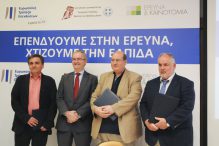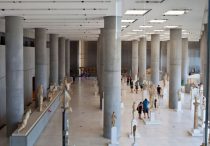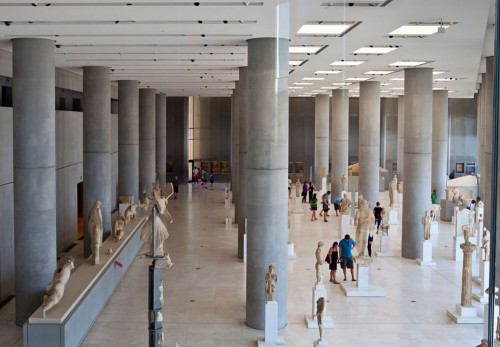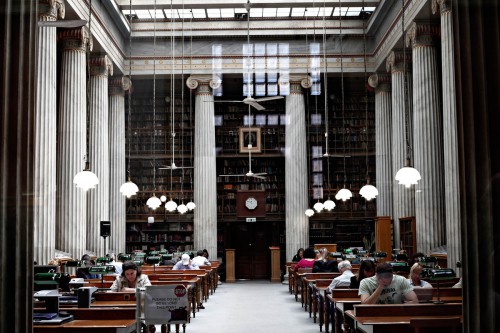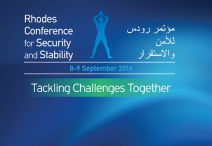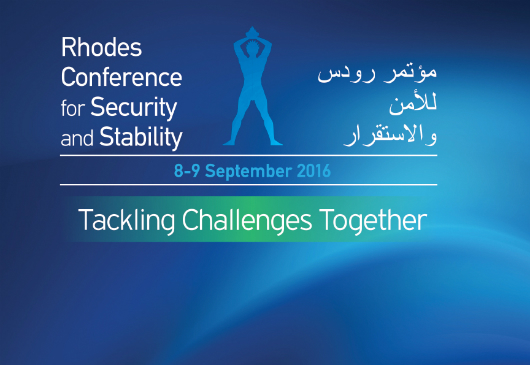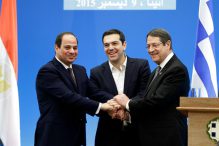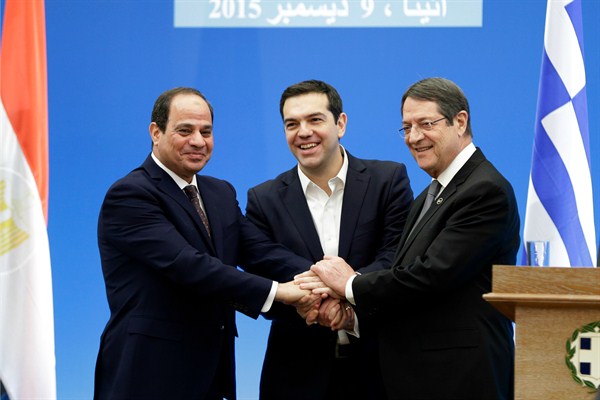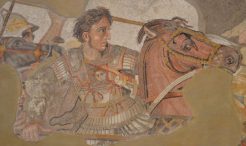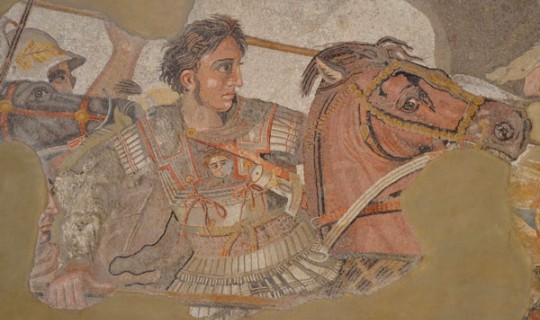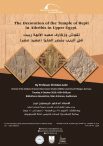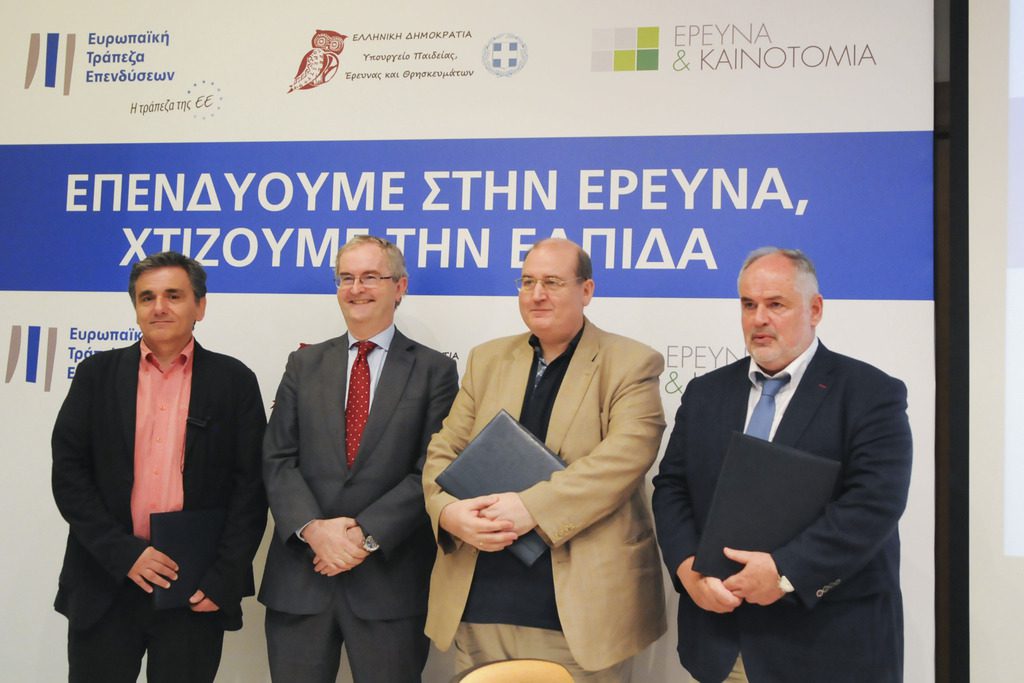 The European Investment Bank has agreed to provide 180 million euros to support the creation and first operations of the new Hellenic Foundation for Research and Innovation (ELIDEK). The creation of the Hellenic Foundation for Research and Innovation was formally announced on 15 July 2016 at a signature ceremony in Athens, attended by representatives from across the Greek research community. Contracts confirming the new European Investment Bank (EIB) backing were signed by Finance Minister Euclid Tsakalotos, Minister of Education, Research and Religious Affairs Nikos Filis, Alternate Minister for Research and Innovation Costas Fotakis and European Investment Bank Vice President, Jonathan Taylor.
The European Investment Bank has agreed to provide 180 million euros to support the creation and first operations of the new Hellenic Foundation for Research and Innovation (ELIDEK). The creation of the Hellenic Foundation for Research and Innovation was formally announced on 15 July 2016 at a signature ceremony in Athens, attended by representatives from across the Greek research community. Contracts confirming the new European Investment Bank (EIB) backing were signed by Finance Minister Euclid Tsakalotos, Minister of Education, Research and Religious Affairs Nikos Filis, Alternate Minister for Research and Innovation Costas Fotakis and European Investment Bank Vice President, Jonathan Taylor.
The new Hellenic Foundation for Research and Innovation is a public science council that will be established in accordance with best practices from across Europe and around the world. The Foundation will receive 240 million euros by the Greek state and the EIB, in addition to grant funding from the EU National Strategic Reference Framework and the EU Horizon 2020 programme. The Foundation’s aim is to support the national strategy for research and innovation and Greece’s National Growth Strategy by providing funding for fundamental research by universities, higher technology institutes and public science institutions.
Halting the Brain Drain
The financial crisis has had a dire impact on the Greece’s Research & Innovation funding prospects. The lack of funding opportunities resulted to an exodus among the country’s graduate and postgraduate students, and froze research and innovation throughout the country. The setting up of the Hellenic Foundation for Research and Innovation aims to reinvigorate research culture in Greece, increase scientific output, and ultimately reverse the trend. The move represents the first dedicated backing for fundamental research in Greece by the EIB, Europe’s long-term lending institution. Once operational, the Foundation will manage the evaluation and financing of research projects, academic positions and investment in scientific equipment in order to strengthen research financing in Greece and to ensure that research jobs can be created for young scientists and doctorial students, who might otherwise leave the country to seek opportunities elsewhere.
During the signature ceremony, Costas Fotakis, Alternate Minister for Research and Innovationhighlighted that “the creation of the Hellenic Foundation for Research and Innovation represents a key step, especially given the crisis being experienced by the country. The first objective of this initiative is to take immediate measures to address the current situation. The second objective is to create an efficient and merit-based mechanism for optimal financing of research in the long term. This project’s success will contribute to strengthening the knowledge economy in the country.”
Nikos Filis, Minister of Education, Research and Religious Affairs underlined that the first phase of ELIDEK’s operation will be financed by the European Investment Bank, which is providing 180 million euros over 3 years and the Greek government’s Public Investment Programme, providing 60 million euros over 3 years, adding that “through the new Foundation we aim to provide the basis for effective development of research, education, and a knowledge economy that contributes to productivity and social reconstruction.”
Euclid Tsakalotos, Minister of Finance, stated that with the Foundation, Greece is laying the groundwork to move on from the vicious circle of recession to the virtuous circle of inclusive development. He added that the European Investment Bank will continue to play an important role by investing in priority sectors for the government, including research and innovation. He concluded that this kind of investment initiatives demonstrate a vote of confidence on the growth prospects of the Greek economy.
“The European Investment Bank is pleased to expand our firm engagement in Greece through 180 million euros backing for the new Hellenic Foundation for Research and Innovation. This is the first time that the EIB has backed research activity at a national level in Greece. Our significant support reflects the Foundation’s potential to strengthen Greek excellence in science and innovation and ensure a future in Greece for young Greek researchers.” said Jonathan Taylor, European Investment Bank Vice President responsible for lending operations in Greece.
The new bill, PhD and PostDoc grants
A parliamentary bill to establish the agency is currently being discussed – the public consultation phase was concluded in early July 2016. But Alternate Minister Costas Fotakis is also launching calls for some PhD and postdoctoral grants immediately.
The new bill, expected to be voted by the Greek parliament this autumn, proposes that the ELIDEK operate along the lines of the US National Science Foundation and the Germany’s main funding agency DFG – and without direct political influence. The funds will be earmarked exclusively for funding young scientists, infrastructure and equipment, as well as for research programmes carried out by universities, tertiary technical schools (TEI), and research centres around the country. ELIDEK is also expected to provide seed capital for innovation and start-up companies in their nascent stages.
Greece’s Science potential & internationally competitive research centres
Despite the challenges posed to scientific research by the crisis, the country still manages to host several internationally competitive research centres: The Foundation for Research and Technology-Hellas (FORTH), established in 1983, is one of the largest research centers in Greece with a reputation as a top-level research foundation worldwide, focusing areas such as: Microelectronics, Lasers, Materials, Molecular Biology & Genetics, Biotechnology, Bioinformatics, Robotics, Telecommunications and Computational Mathematics. The National Center for Scientific Research “Demokritos” (NCSR “Demokritos”), inaugurated in 1981 is the largest multidisciplinary research center in Greece, with critical mass in expertise and infrastructure in the fields of Nanotechnology, Energy & Environment, Biosciences, Particle and Nuclear Science, Informatics and Telecommunications. The Centre for Research and Technology-Hellas (CERTH), founded in 2000 is listed among the TOP-25 E.U. institutions with the highest participation in competitive research grants, with has important scientific and technological achievements in many areas including Energy & Environment, Mechatronics, Information & Communication, Transportation & Sustainable Mobility, Health, Agro-biotechnology and Smart farming. The Corallia cluster established in Greece the systematic management and development of innovation clusters, and has so far fostered the creation of three highly-specialised cluster initiatives in knowledge-intensive thematic sectors, the gi-Cluster (gaming and creative technologies & applications), the mi-Cluster (nano/microelectronics-based systems and applications) and the si-Cluster (space technologies and applications).
The Organisation for Economic Co-operation and Development (OECD) has released a list (Oct 2015) that ranks countries based on the highest number of scientists it ‘produces’ per capita. Greece was placed among the 10 ‘smartest’ countries in the world in fields such as mathematics, physics, technology and engineering.
(www.greeknewsagenda.gr)
 “It’s funny, I never wanted to use classical Greek art, because being from there, it seemed too obvious,” she said with a shrug after her show to a journalist from Vogue. “But this time, I thought, ‘Why not?’”
“It’s funny, I never wanted to use classical Greek art, because being from there, it seemed too obvious,” she said with a shrug after her show to a journalist from Vogue. “But this time, I thought, ‘Why not?’”


